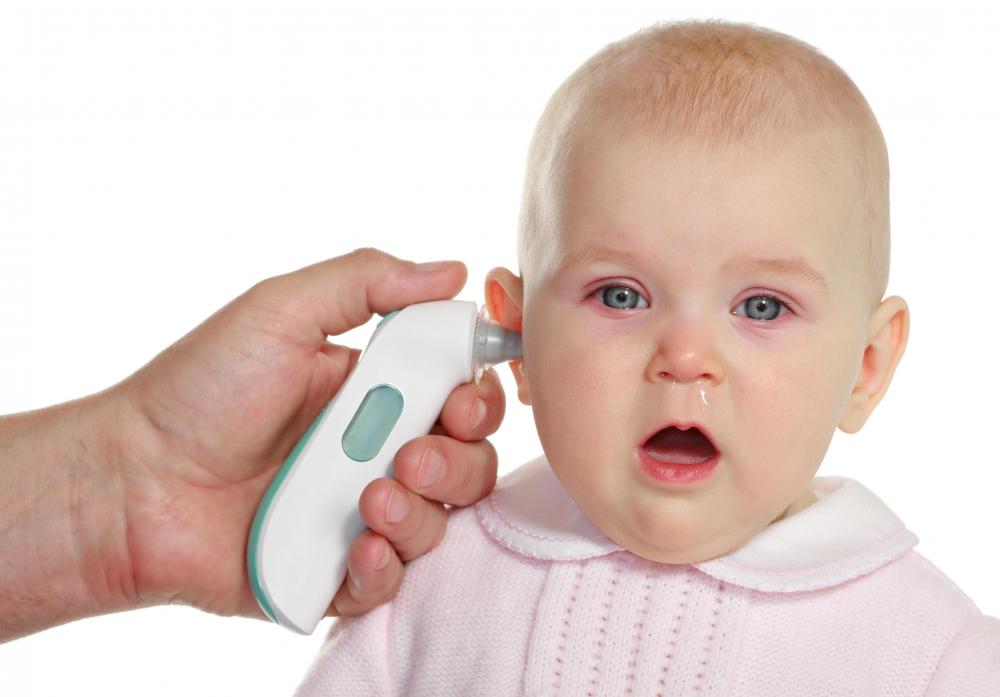At WiseGEEK, we're committed to delivering accurate, trustworthy information. Our expert-authored content is rigorously fact-checked and sourced from credible authorities. Discover how we uphold the highest standards in providing you with reliable knowledge.
What are the Signs of Teething?
When a baby begins to grow teeth, she may show signs of teething. New teeth can begin to appear as early as three months of age, and most children have a full set of 20 teeth by the age of three. Common signs of teething include irritability, drooling, and an increased desire to chew. The baby's gums may appear red or swollen. Some babies are severely affected by teething, while others may show very few symptoms.
Irritability is one of the most common signs of teething. The new teeth pushing through the gums can be extremely uncomfortable, which can make a baby fussy or over-sensitive. The pain may increase at night, causing the baby to sleep restlessly and cry frequently during the night. The large size of molars may cause a baby to be even more irritable than when smaller teeth are coming in. If a baby is fussing while rubbing her cheeks or pulling her ears, it could mean the baby is teething.

An increased tendency to drool and flushed cheeks are other common signs of teething. A baby who drools a lot may develop a rash on the chin or neck, due to the constant moisture and frequent wiping. Some babies also get red, warm cheeks as a result of the pain in the mouth. In most cases, the drooling decreases once the tooth appears but begins again when another tooth starts pushing through. Some parents report that loose stools are another indication of teething, which may be the result of swallowing extra saliva. The baby may also cough or gag because of saliva in the throat.

Babies often try to chew anything they can get into their mouths, as the pressure on the gums seems to help relieve the pain. Giving the child cold foods, refrigerated wet cloths, or teething rings can help relieve the pain. Gently massaging the baby's gums with a finger may also help. Some parents opt to give painkillers or topical teething gels, which may be effective for some babies.

If a child is old enough to begin teething, and if there are other signs of teething, an examination of the gums should confirm whether teeth are coming in. Generally the front bottom incisors are the first teeth to come in. The gums in the area are often swollen and red. When pressed with a finger, the tooth might be felt before it is seen. Sometimes a small slit appears where the tooth will come out.
AS FEATURED ON:
AS FEATURED ON:

















Discussion Comments
I've heard that most kids get grouchy when they're teething. Surprisingly, my son doesn't. He just drools a lot and tries to chew on everything he finds to relieve teething pain.
The drooling is very bad though. I have to run after him with a tissue constantly. I'm scared that he's going to develop a yeast infection or something from all the drool.
@simrin-- Yep, teething symptoms can be similar to cold symptoms. It can be difficult to tell them apart. Keep an eye on her fever and see if it worsens or if she develops additional symptoms. If not, it's most likely teething.
My son used to get a runny nose and flushed face when he was teething. He would also lose his appetite. The first couple of times, I thought he was sick and rushed him to the doctor. Around the third or fourth time, I got used to it and knew right away that a tooth was getting ready to come through.
Try some teething remedies like a teething gel and see if that makes her feel better. If you have a humidifier at home, that will help with congestion.
Can teething cause cold symptoms?
My daughter has a slight fever and a stuffy nose since the past few days. The fever is not consistent and seems to come and go. I don't know whether these are signs of infant teething or a cold.
Post your comments